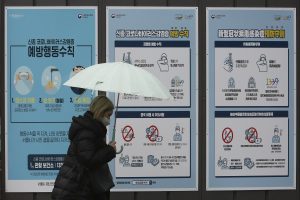COVID-19 continues to ravage the global economy, setting forth the path to a new normal. As an unprecedented health crisis, it has been a litmus test of sorts — challenging the efficacy of conventional regulatory approaches while giving rise to interactive models like “agile governance.” The success of Taiwan and South Korea in combating COVID-19 showcased the viability of agile governance in mitigating a the pandemic by harnessing the power of big data.
Agile governance is defined as an adaptive, human-centered, inclusive, and sustainable approach to policy-making. It shifts the process of generating and enforcing top-down policies into a multistakeholder approach by optimizing the tools and opportunities of the Fourth Industrial Revolution. Agile governance’s defining hallmark rests on its capability to address time-sensitive issues in today’s digital societies. It embraces constant evaluation or feedback through impact assessments.
The role of big data is crucial to Taiwan and South Korea’s public health toolkits. By implementing data-driven solutions both have achieved favorable outcomes to flatten the curve: contact tracing at the early onset of the pandemic, managing of supply chain and medical resources, and ensuring timely updates on the crisis. Key in harnessing such data-driven solutions are the collaborative efforts of diverse actors under the strict observance of legal standards on data privacy and protection.
The current “Taiwan model” was shaped by Taipei’s exclusion from the World Health Organization (WHO), along with the lessons from the SARS outbreak in 2002-3. Without direct representation and access to WHO, Taiwan is at a higher risk in the event of another potential health crisis.
As soon as the WHO reported that it had been notified of the existence of a pneumonia from an unknown cause in Wuhan, China, on December 31, 2019, Taiwan implemented stringent monitoring among passengers traveling or arriving from Wuhan. In early January, Taiwan activated the Central Epidemic Command Center (CECC) under the National Health Command Center. In coordinating a whole of government response, CECC relied on big data analytics to counter the rising health crisis for contact tracing.
Within the same period, the National Health Insurance Administration and the National Immigration Agency created a joint-data base that enables a risk assessment approach to identify possible infections based on travel histories of foreigners and citizens arriving in Taiwan. By scanning QR codes upon entry, passengers recorded their health information and travel itineraries. The joint-database was shared among Taiwanese hospitals, pharmacies, and clinics to extract relevant information to classify a patient’s risk level based on his or her travel history within 14 days.
Similar to Taiwan, South Korea has capitalized on its experience in confronting the MERS outbreak in 2015. At the onset of the COVID-19 crisis, the Korean Center for Disease Control and Prevention or KCDC employed the Global Epidemic Prevention Platform or GEPP system. The digital platform integrates two critical data: first, the global infectious disease data culled from the national health authority, and mobile data provided by the Korean Telecom or KT.
Under the oversight of the Korean National Police Agency, KCDC applies the aggregated data from the GERP system for real-time monitoring of potential and confirmed cases among individuals who are traveling or visiting high disease risk-areas. Korean residents and citizens can also communicate with health authorities using the GEPP mobile app or learn the latest information on infectious disease.
Refashioning the typical public-private partnerships, the crown jewel in both Taiwan and South Korea’s agile approach was their openness to embrace the invaluable contribution of their respective tech communities.
Taiwan’s Digital Minister Audrey Tang coordinated civil-society organizations to build a mask supply and demand platform. The name-based mask rationing system uses big data available on the health insurance database to check the availability of masks on local pharmacies or health centers using an online-real time map.
The South Korean government made the API data available to encourage greater collaboration with the private sector and its indigenous startup ecosystem. According to Vice Minister Jang Seokyoung of the Ministry of Science and ICT, making the data publicly accessible sparked the creation of various “Masked apps” to ameliorate the shortage of masks. South Korea’s largest digital and messaging platforms Naver and Kakao also shared API and Cloud data to improve the inventory of mask supplies through their map-related apps.
The catalyst in forming such trust among government actors, private sector, civil society organizations, and the general public was rooted in the equitable recognition in utilizing citizen data for the greater good. Although far from perfect, such a multistakeholder consensus was supported by legal and regulatory frameworks that ensure individual liberties are not compromised, under transparent and strict oversight.
During a national health crisis, South Korea can enforce the Infectious Disease Prevention and Management Act, enabling government-related ministries and private sector partners to use the private information of potential and confirmed patients in assessing interventions to prevent any potential contagion. This adds another layer to the Personal Information Protection Act that already safeguards data privacy and protection.
Taiwan’s data-sharing framework is implemented under strict compliance with the Personal Data Protection Act. Similar to South Korea, it serves as a safety net in regulating the collection, processing, and leveraging of personal data, most especially during a public health crisis that permitted responsible data-driven solutions.
As leadership in global health governance remains in limbo, South Korea and Taiwan stand out with their nimbleness. They build a strong case on how agile governance can provide concrete solutions in navigating the state of affairs in the current and post-COVID-19. Founded on collaboration, transparency, and accountability, their agile responses are spread open for the world to emulate.
Mark Manantan is a non-resident fellow at the Center for Southeast Asian Studies at the National Chengchi University. He is the founder and strategic director of Bryman Media. Views expressed are entirely personal.

































